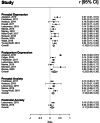Adverse childhood experiences and maternal anxiety and depression: a meta-analysis
- PMID: 33430822
- PMCID: PMC7802164
- DOI: 10.1186/s12888-020-03017-w
Adverse childhood experiences and maternal anxiety and depression: a meta-analysis
Abstract
Background: It has been proposed that adverse childhood experiences (ACEs) can put women at risk for mental illness in the pregnancy and postpartum periods. While some studies have found strong support for this proposition, others have found weak or no support. This study is a meta-analysis of the association between ACEs and maternal mental health to resolve between-study discrepancies, and to examine potential moderators of associations.
Methods: Three electronic databases (i.e., MEDLINE, Embase, and PsycINFO) were searched up to November 2018 by a health sciences librarian. A hand search was conducted in January 2020 and relevant studies were added. Included studies reported on associations between ACEs and maternal depression and/or anxiety in the perinatal period (pregnancy to 1-year postpartum). Pregnancy and postpartum outcomes were examined separately for both depression and anxiety. Random-effect meta-analyses were conducted. Moderator analyses were conducted using meta-regression. Study quality was evaluated using a 15-point scale.
Results: The initial search yielded 4646 non-duplicate records and full text review occurred for 196 articles. A total of 15 studies (N = 7788) were included in the meta-analyses, of which 2 were also described narratively. Publication year ranged from 1998 to 2019. Mothers were approximately 28.93 years of age when they retrospectively reported on their ACEs. All studies had maternal self-report questionnaires for the mental health outcomes. Study quality ranged from 7 to 12. The pooled effect sizes between ACEs and prenatal (N = 12; r = .19; 95% CI= .13, .24) and postpartum (N = 7; r = .23; 95% CI = .06 to .39) depressive symptoms were significant. The pooled effect size between ACEs and prenatal anxiety was also significant (N = 5; r = .14; 95% CI= .07, .21). Moderator analyses indicated that timing of depressive and anxiety symptoms may be important for understanding associations.
Conclusions: ACEs confer risk to maternal mental health, albeit effect sizes are small to moderate in magnitude. Trauma-informed approaches, as well as increased mental health support during and after pregnancy, may help to offset the relative risk of ACEs on maternal mental health.
Keywords: Adverse childhood experiences; Anxiety; Depression; Postpartum; Pregnancy.
Conflict of interest statement
There are no competing interests to report.
Figures
References
-
- WHO . Maternal mental health and child health and development in low and middle income countries. 2008.
Publication types
MeSH terms
LinkOut - more resources
Full Text Sources
Other Literature Sources



